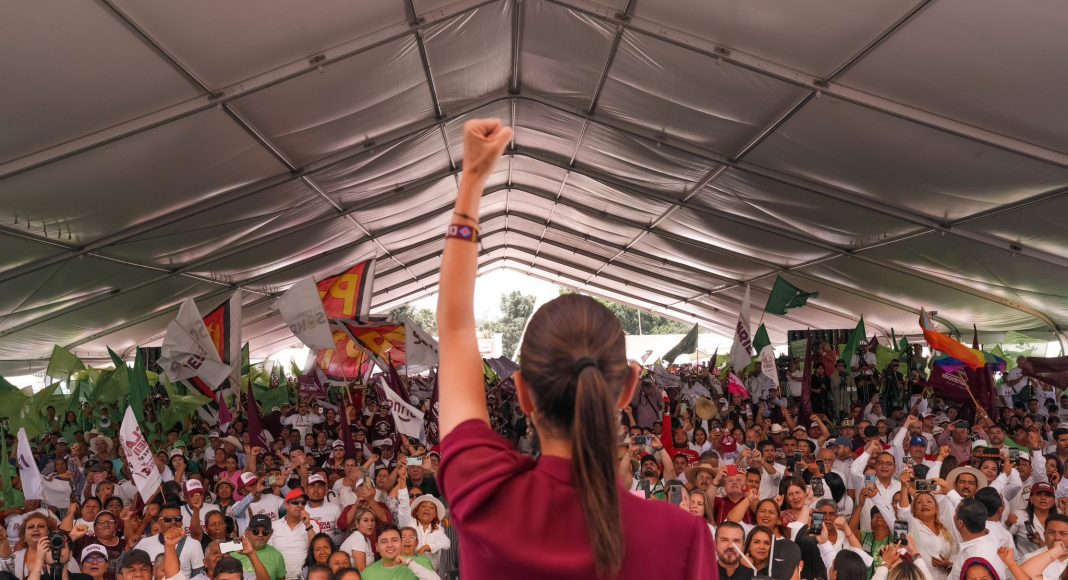The Mexican Presidential and Federal elections of 2 June saw Claudia Sheinbaum of the National Regeneration Movement (Morena), along with her allies in the Ecologist Green Party and Labour Party, win nearly 60% of the votes for President. From October the Morena party and allies will control 24 state governorships, 243 seats in Congress, and 60 seats in the Senate. With its allies this would be 365 (of 500) Congress seats and 83 (of 128) Senate seats. This completes a 20 year long shift in Mexican politics. The Mexican bourgeoise, however resentfully sided with US imperialism, now finds itself forced to make increased concessions to its own working class.
Claudia Sheinbaum is the first woman ever to hold the post of president. She received twice the votes cast for the main opposition candidate Xóchitl Gálvez of the National Action Party (PAN) with his allies – the decayed Institutional Revolutionary Party and the Party of the Democratic Revolution.
The Environmentalist, Clara Brugada of Morena, was also voted in as mayor of Mexico City, a historical bastion of the left. This follows from the long campaigns that led to abortion being decriminalised by September 2023, in direct contrast to opposite moves in the US.
Horrified at the results, The Economist (6 June) declared that ‘Morena and its coalition allies … pose a grave threat to Mexico’. Alarmed that the election result prompted an immediate fall of 4% in the peso against the dollar (altogether by 10% from April), and the stock exchange prices fell 6%, it argued that ‘investors’ feared that the government’s supermajorities across the 32 states would undermine democracy and make it harder for them to ‘operate’(sic) in Mexico.
‘The Suffocation of Mexico’s Democracy’ is a common theme of anxious bourgeois journalism as the masses demanded that outgoing president and founder of Morena, Andrés Manuel López Obrador (AMLO), pressed further with his ‘Transformation’ programme. Mexican reactionaries already openly refer to the US, and the financial markets, as the ‘last barrier to an authoritarian turn’[1]. Right wing commentators hopefully point to Morena’s alliance with the opportunist Green Party which won almost 7% of the vote (4,677,057 votes) as a source of potential discord e.g. Morena’s reliance on the nation’s heavily indebted Petroleos Mexicanos (Pemex) oil industry and its ecologically contentious Tren Maya (Mayan Train) proposal. Moreno’s anti-neo-liberal ideas contrast with the fact that Mexico is a source of cheap labour and resources for US and European imperialism, a persistent contradiction facing many national leaderships in all the so called ‘developing’ economies.
The national bourgeoisie
In September 2024, Morena’s party congress will renew its local and national leadership for a government, with a budget deficit to manage. The long-standing conflict between US imperialist interest and the Mexican national bourgeoisie’s independent ambitions will undoubtedly flare up. Blinken has already embraced the new government to steer it away from any radical temptations. The imperialist states fear that Sheinbaum’s massive majorities will force her to meet the demands of her voters and hinder, even remove, continuing opportunities for their plundering presence. Millions of workers, previously left out of national political life, have been drawn into it by Moreno. In the election campaign fracking, opencast mining and imports of genetically modified corn were all threatened with bans. However, AMLO’s incapacity to bring to court members of the Army and Navy, for crimes committed from the ‘dirty war’ (1964-82) to the present, shows the ability of a bourgeois establishment, in league with US imperialism, to set limits to government authority. The horrific case of the 2014 murders of the 43 Ayotzinapa students is still pending as AMLO leaves office. The continuous expansion of the economic power of organized crime – with revenues and arms from the US – illustrates the limits to Mexican government authority.
Working poverty
Since 2018, and despite the intervening Covid pandemic, poverty rates were reduced for the first time in forty years. AMLO’s electoral motto was “For the good of all, the poor first”. From 2019 the minimum wage has consistently risen and social programs reached tens of millions of households through the “Servants of the Nation,” more than 19,000 former party members and sympathizers hired by the government to bypass the traditional bureaucracy at the street level, to identify those eligible for more help from various programs promised for farmers, the disabled, unemployed youth and the elderly. Large public infrastructure works have been introduced especially in the southern regions, abandoned in the previous decades.
At the same time U.S. foreign direct investment (FDI) in Mexico is $130.3bn, up 7.6% from 2021. Mexico’s FDI in the United States (stock) was $33.8 billion in 2022, up 21.5% from 2021. This joint exploitation of labour and resources by capital owned by the competing bourgeoisie of both countries, hits both Mexican and US workers. The official Mexican unemployment rate was at 2.7% in April 2024, at 1.64 million, with 59.41 million workers employed. However, 35.8% of all Mexican employees still lived in poverty (first quarter of 2024), despite being the lowest level in nearly 17 years. Mexican workers work the greatest number of hours yearly in the world (OECD and WTO). Cheap Mexican exports and large US company profits in Mexico mean that a huge labour aristocracy in the US lives off the plunder from Mexican workers, including the 14.9m working in the USA. Anti-imperialism is the only rational position for Mexican workers to take.
[1] ‘The Suffocation of Mexico’s Democracy’ E. Krauze in Project Syndicate 10 June 2024, wrote ‘while the vote itself may seem like a triumph of democracy, the election’s outcome represents a major step backward’.




